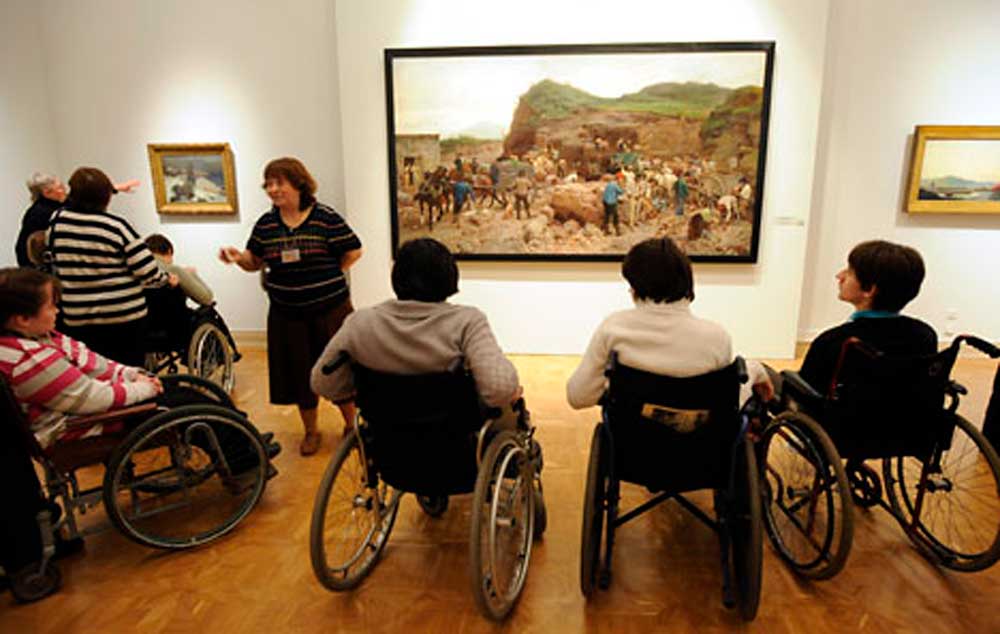Maria Bondar and Natalia Gasparyan have injuries to the spine. They went to school together and the last year of studies have begun to dream of opening their own business. After college, she is a graduate of the German Department of the Faculty of Leningrad State University, while Natalia has trained as an economist at the University of Technology of natural polymers and has worked with as an interpreter-guide for tour groups Germans visiting St. Petersburg, began to notice the difficulties of travel in a wheelchair, even find a guide available to accompany them.
“For most of the tour guides is to make ten times as much work,” says Maria Bondar. “You have to make sure that a disabled tourist does not fall behind the group, and you often have to push the wheelchair.” But unlike most of their colleagues, the two friends were very happy to help people in wheelchairs, and in 2004, Maria and Natalia decided that this would be their business.
A normal tour is to show tourists the most typical places, organize meals, hotel accommodation and evening programs. But for a disabled traveler visiting St. Petersburg this was almost impossible. Before St. Petersburg had no hotels with doors wide enough for wheelchairs to pass or special showers. So Maria and Natalia, at the beginning, they decided to limit itself to visit the city on the Baltic Sea with cruise passengers.
To prepare then a normal route to St. Petersburg, accessible to people with disabilities, the two women decided to try a tour in a wheelchair with friends. “On a wheelchair we have tried to get around the city, to get into museums and churches,” said Maria Bondar.
Each visit has been a real test for the museum staff. Even if a public entity should have special facilities for wheelchairs, in most cases, had never been used. The museum staff we wanted to help, but there have been exceptions: “Wheelchairs? Spend over my dead body! Not on the floor of the seventeenth century,” responded a director of a museum.
In other cases, it was only thanks to the obstinacy of the entrepreneurs that some sites have become accessible to people with disabilities. In one of the famous palaces of St. Petersburg, it was necessary to communicate the arrival with a week’s notice in order to use the elevator and even then access was not always easy.”If we had been just a little ‘late, the keeper would have started to cry,” says Mary. Today there is a special concierge service.
The two women took a year to plan the tourist route right. The first destinations along the route were the Russian Museum and the Hermitage, more or less equipped technically, and then was added to the Museum of the History of Religion.
Ravilya and Petr Morozov and Yuri Kuznetsov, founder of “We’re Together”, an organization for people with disabilities based in St. Petersburg, began testing sites for accessibility with wheelchair and have become co-founders of ‘tourism agency. The group decided to call themselves “Freedom.” Natalia and Maria have started to promote their company through tourist agencies in other countries, and social networks.
Friends accompanied them in the first excursions, not running smoothly. To transport a German woman in wheelchair, up three steps at the Cathedral of the Savior on Spilled Blood, the husband of Mary used a portable aluminum ramp that he built with his own hands.
In 2007, members of “Freedom” for the first time took a loan, 750,000 rubles (about $ 26,000) from Sberbank. They used the money to buy a truck for the transport of fruit. The husband of Mary Bondar, a professional mechanic, he converted to passenger transport. And is particularly proud of the special platform that can lift a wheelchair up to the level of the bus. “Our vehicle is amazing, even our foreign tourists were amazed,” acknowledges Mary.
“Freedom” offers tours to disabled Russians, but the majority of them have very low incomes. So the company has decided to pay a little ‘more to foreigners in order to provide discounted tours to the Russians. The agency has hosted tourists from Germany, Austria, Switzerland, the United States, Canada and Israel. In addition to St. Petersburg, “Freedom” organizes visits to Moscow, in the region of Moscow and Novgorod. The cost of the tour (ticket not included) is € 100-400 per person for two days and € 1,000-2,000 for trips of a week.
Winning the award “Our Future” Foundation Vagit Alekperov, “Freedom” was able to get an interest free loan of 1.72 million rubles (over $ 58,000) for four years. The company used this money to put the air conditioning on and develop minibus routes in other cities, such as Kiev. Future plans include the purchase of a new, modern bus which will cost approximately 2.5 million rubles (approximately $ 85,000), including amendments. A major international pharmaceutical company has approached the initiative.
The agency is planning to expand its offerings to tourists with hearing problems. “We are ready to create an empire,” anticipates Mary. His ideas are also a hostel and a chain of nightclubs accessible to all, including people with disabilities, a specialized fleet of buses, a TV magazine on travel with a wheelchair and a guide to St. Petersburg for people with disabilities.
Source: Russia OGGI



